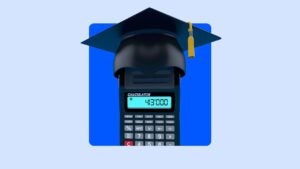How long does it take to pay off student loans?

Key takeaways
- The average time it takes to pay off student loans can vary greatly based on factors like loan amount, interest rate and repayment plan.
- Federal student loan borrowers have access to various repayment plans, including income-driven plans, while private loan borrowers may have fewer options.
- Making extra payments or refinancing to a shorter term can help you reach the finish line faster and save you a bundle in interest.
- It is important to carefully consider any repayment options you have and make a plan to pay off student loans strategically.
The average time a student takes to pay off student loans varies based on many factors, including their total loan amount, annual percentage rate (APR) and monthly payment. Although the standard repayment term for federal loans is 10 years, it can take students up to 30 years or longer to pay off student loans.
If you can afford to make extra payments on your student loans, you can pay them off faster and save money.
When will my student loans be paid off?
Students who graduate with federal student loan debt are automatically enrolled in the standard repayment plan, which lasts 10 years. You can change the repayment plan if you need more flexibility.
Federal repayment plans
Borrowers are automatically enrolled in the Standard repayment plan. You can also opt to follow a Graduate or Extended repayment plan if it works better for you. If you prefer the latter, reach out to your loan servicer and request that your payment plan be switched.
| Federal repayment plan | Repayment term | Type of payment |
| Standard repayment plan | 10 years (10 to 30 years for Direct Consolidation Loans) | Fixed |
| Graduate repayment plan | 10 years (10 to 30 years for Direct Consolidation Loans) | Graduated |
| Extended repayment plan | Up to 25 years | Fixed or graduated |
The standard and graduate repayment plans come with the same repayment terms — 10 years for most loans and up to 30 years for direct consolidation loans. The key difference is that, unlike the standard repayment plan, the graduate repayment plan has graduated monthly payments — payments start out low and gradually increase every two years.
If neither of these options is a good fit for your finances, there’s also the Extended repayment plan. It comes with a repayment term of up to 25 years and has fixed or graduated monthly payments.
Income-driven repayment plans
Federal loans also come with access to five types of income-driven repayment plans you can apply for, depending on your loan type:
-
Revised Pay As You Earn Repayment Plan (REPAYE Plan): Pay 10 percent of your discretionary income for 20 years, or 25 years if graduate school loans are included in the plan.
-
Pay As You Earn Repayment Plan (PAYE Plan): Pay 10 percent of your discretionary income for 20 years.
-
Income-Based Repayment Plan (IBR Plan): Pay 10 percent of your discretionary income for 20 years if you’re a new borrower (on or after July 1, 2014) or 15 percent of your discretionary income for 25 years if you’re not a new borrower.
-
Income-Contingent Repayment Plan (ICR Plan): Pay 20 percent of your discretionary income for 25 years or what you would pay on a 12-year repayment plan adjusted to your income.
-
Income-Sensitive Repayment Plan (ISR Plan): Make payments on FFEL Loans based on your income over a period of up to 10 years.
| Income-driven repayment plan | Repayment term | Type of payment | Qualification requirements |
| Saving on a Valuable Education Plan (SAVE Plan — formerly referred to as the REPAYE Plan) | 20 to 25 years | Varies by income |
10% of your discretionary income Must be lower than your monthly payment would be on a Standard Repayment Plan Loan must be in good standing |
| Pay As You Earn Repayment Plan (PAYE Plan) | 20 years | Varies by income |
10% of your discretionary income Must be lower than your monthly payment would be on a Standard Repayment Plan Loan must be in good standing |
| Income-Based Repayment Plan (IBR Plan) | 20 to 25 years | Varies by income |
10% or 15% of your discretionary income Must be lower than your monthly payment would be on a Standard Repayment Plan |
| Income-Contingent Repayment Plan (ICR Plan) | 25 years | Varies by income |
20% of your discretionary income Loan must be in good standing |
Private student loan lenders have other repayment options. In general, you can expect to repay your private student loans within five to 20 years unless you choose to refinance.
When do you start paying back student loans?
Borrowers with federal student loans are required to make their first payment six months after they graduate, leave school or drop below half-time enrollment. If they can’t afford to make payments once repayment starts, they can apply for a deferment or forbearance or switch to a different repayment plan.
Most private lenders also provide a six-month grace period for borrowers, and some may extend this to nine or 12 months. Contact the lender to find out when your first payment is due. Many private lenders also offer a forbearance program.
What are some factors that could impact my student loan repayment?
While standard repayment puts you on track to pay off your student loans within 10 years, several scenarios could lengthen or shorten your student loan repayment.
Enrolling in deferment or forbearance
Deferment and forbearance periods allow you to temporarily stall your monthly student loan payments due to unemployment, financial hardship or enlistment. Both deferment and forbearance are offered to all federal student loan borrowers, and many private lenders also offer forbearance programs.
Enrolling in one of these programs will delay your final due date. If you take a three-year deferment, you’ll add three years to your original repayment term. It may also add the unpaid interest to your student loan balance, which will increase the total interest paid over the life of the loan.
Refinancing student loans
Refinancing is when you take out an entirely new private student loan to replace your current loans. You’ll have new loan terms, a new interest rate and often a new lender.
Because you get new terms when you refinance, refinancing could change the amount of time it takes to pay off your loans. You can select shorter terms if you can handle the larger monthly payments, or you can extend your repayment timeline to lower your monthly bill. Picking a longer term may also increase the total interest paid over the life of the loan.
Refinancing federal student loans into a private student loan will cause you to lose all federal protections. You’ll also be ineligible to participate in federal repayment programs.
Adjusting your payment schedule
You’re not beholden to making only one payment a month. If you make payments every three weeks or biweekly, you’ll shorten the time you spend paying your loans. For instance, making 26 half-payments over the course of the year amounts to 13 full payments, or one extra payment. Doing this for three years cuts out three months from your repayment timeline.
If you regularly miss payments or don’t make the full payment, you could lengthen your loan term. Missing payments also puts you at risk of late fees and negative marks on your credit score.
Bottom line
Your student loan repayment timeline depends on how much you owe, your interest rate and the loan term. Federal loans generally come with repayment periods between 10 and years, while five to 20 years is more customary for private loans.
If you have the means, consider making extra payments to pay the loans faster and keep more of your hard-earned money in your pocket. But if you can’t afford the monthly loan payments, explore refinance options or reach out to your loan servicer or lender to inquire about alternative repayment plans.
Frequently asked questions
Why we ask for feedback Your feedback helps us improve our content and services. It takes less than a minute to complete.
Your responses are anonymous and will only be used for improving our website.






